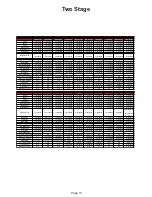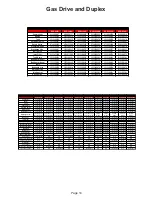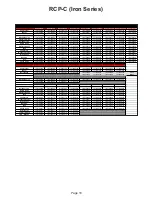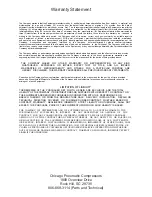
Page 9
!
DANGER
Low discharge pressure
1. Reduce air demand or use a compressor
with more air capacity.
2. Listen for air leaks. Apply a soap solution
to all fittings and connections. Bubbles
will form at points of leakage. Tighten
or replace fittings or connections.
3. Clean or replace air filter.
4. Replace necessary gaskets.
5. Remove head and inspect for broken or
misaligned valves. Replace valves, if
necessary.
Install a new head gasket
each time head is removed
1. Tighten drive pulley or flywheel bolt.
2. Check for proper oil level. Low or dirty
oil may cause bearing damage.
3. Replace connecting rod and/or connecting
rod bearings.
4. Replace check valve.
with air pressure in tank
1. Replace with new piston rings.
2. Clean or replace air filter.
3. Drain oil to proper oil level.
4. Use a quality non-detergent 30 or 40wt
oil specified for each model (Page 4).
1. Drain tank at least once per day.
2. Add an inline filter to reduce moisture in
the air line.
1. Check voltage with volt meter across both
legs of incoming power. Check reset button
on motor.
2. Repair or replace pressure switch.
3. Replace check valve or pressure switch.
Do not remove check valve
with air pressure in tank
1. Make sure the breaker is sized properly.
See page 6 in this manual.
2. Check voltage with volt meter across both
legs of incoming power.
3. Replace motor.
4. Check all electrical connections.
5. Adjust or replace pressure switch.
6. Replace check valve.
Do not remove check valve
with air pressure in tank
1. Replace check valve.
Do not remove check valve
with air pressure in tank
2. Tighten or replace fittings or connections.
3. Replace tank. Do not attempt to repair tank.
Do not remove check valve
1. Compressor too small for
application
2. Air leaks
3. Restricted intake air
4. Blown gasket(s)
5. Broken or misaligned valves
!
DANGER
!
DANGER
!
DANGER
1. Loose drive pulley or flywheel
2. Low on oil
3. Worn connecting rod or
connecting rod bearing
4. Noisy check valve
1. Worn piston rings
2. Restricted intake air
3. Too much oil in compressor
4. Incorrect oil viscosity
1. Normal. Amount of water will
increase as humidity in the
air increases.
1. Low voltage
2. Malfunctioning pressure switch
3. Malfunctioning check valve
1. Incorrect breaker size
2. Low voltage
3. Malfunctioning motor
4. Loose electrical connections
5. Malfunctioning pressure switch
6. Malfunctioning check valve
Tank does not hold
pressure when not
running and shut off
valve is closed
Breaker or reset
repeatedly trips
Will not run or motor
hums
Water in tank and/or
discharge line
Excessive oil carryover
Excessive noise
“knocking”
TROUBLESHOOTING GUIDE
1. Malfunctioning check valve
2. Loose fittings or connections
3. Crack or pin hole in tank
CAUTION
!











































